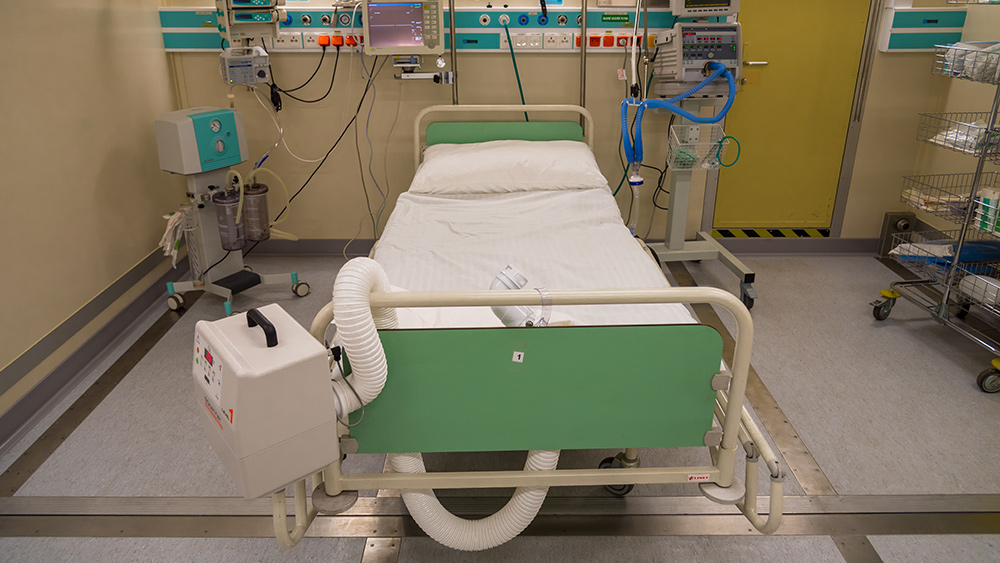American husband tells Clay Clark how budesonide treatment saved his wife from COVID-19 – Brighteon.TV
09/13/2021 / By Nolan Barton

A husband from Georgia shared his experience advocating for his wife and getting her the budesonide treatment in the “Thrive Time Show” with Clay Clark Tuesday, Sept. 7, on Brighteon.TV.
The husband named Mick told Clark that his wife got out of the intensive care unit two days after getting the budesonide treatment and was able to go home in a week. Mick said his wife was in really bad shape after a week of battling symptoms of the Wuhan coronavirus (COVID-19).
“She’s 57, has a partially collapsed lung and has preexisting conditions. Her blood oxygen was 50 and her blood pressure was 100/50,” said Mick. The normal blood oxygen level is between 94 to 99 percent. Anything below 90 is considered to be low blood oxygen.
“I went on battle mode immediately. I thought ‘this is it,'” said Mick, fearing that his wife would be put on a ventilator in which very few patients had survived.
He contacted Dr. Richard Bartlett personally to seek advice about the budesonide protocol that the latter has been promoting since the early days of the pandemic. (Related: Pastor David Scarlett talks to Dr. Richard Bartlett about how COVID-19 is 100% treatable – Brighteon.TV.)
After talking with Bartlett, Mick sent the hospital a fax message asking to put his wife under the budesonide protocol – which is 1 milligram of budesonide every eight hours. He copy furnished the doctor treating his wife, as well as a lawyer whom he didn’t actually hire.
Mick cited several studies and a magazine article about the budesonide protocol, but he thought that what caught the hospital and the doctor’s attention was his threat of escalating the matter to the ethics committee if they don’t grant his request.
Everything Mick and his wife went through had been captured in Bartlett’s remarks during the Grand Rapids, Michigan leg of the Reawaken America Tour last month.
“There are people right now who are getting their loved ones off the ventilator; there are people who are getting their loved ones out of the ICU [intensive care unit] and back to the regular floor; and there are actually patients coming out of the hospital and going back home to their loved ones recovering from COVID, because there are treatment strategies that work,” Bartlett said.
Budesonide significantly reduces COVID-19 hospitalization
Bartlett said researchers at the University of Oxford found that early treatment of inhaled budesonide reduced the need for urgent care and hospitalization in people with COVID-19 by as much as 90 percent. The study also found that inhaled budesonide given to patients with COVID-19 within seven days of symptoms also reduced recovery time.
Participants allocated the budesonide inhaler also had a quicker resolution of fever, symptoms and fewer persistent symptoms after 28 days. The study also demonstrated that there was a reduction in persistent symptoms in those who received budesonide.
“I want people to be equipped and prepared. I want them armed and dangerous against the virus. I want the people to win against the virus,” Bartlett said.
Unfortunately, not all doctors do. “Many of them are scared of doing something that’s not in line with the CDC’s [Centers for Disease Control and Prevention] protocol,” he said.
That’s why Bartlett encouraged people to take their stand now.
“This is not the time to just sit on the sidelines. They [the doctors] might not be listening to the right voice, so you have to stand up for your loved ones. You’re the advocate for your loved one in the hospital right now,” he said.
Doctors have prescribed budesonide for more than 20 years as preventive medicine for asthmatics. Bartlett has written a paper with case reports describing favorable outcomes for two of his patients with the regimen. A lab study in the U.S. also showed that budesonide inhibited the ability of a coronavirus to replicate and inflame the airways.
Remdesivir causes multiple organ failure
The only treatment for the disease approved by the Food and Drug Administration (FDA) involves remdesivir. It is approved for use in adults and children at least 12 years old who weigh at least 88 pounds (40 kilograms).
Remdesivir is an antiviral medication that targets a range of viruses. It was originally developed over a decade ago to treat hepatitis C and a cold-like virus called respiratory syncytial virus (RSV). Remdesivir wasn’t an effective treatment for either disease, but it showed promise against other viruses.
It works by interrupting the production of the virus. Coronaviruses have genomes made up of ribonucleic acid (RNA). Remdesivir interferes with one of the key enzymes the virus needs to replicate RNA, preventing the virus from multiplying.
According to reports, up to 31 percent of patients who received remdesivir have developed multiple organ failure and/or acute kidney failure. (Related: Dr. Ardis reveals hospitals’ COVID “death protocol” to Jeff and Shady – Brighteon.TV.)
Midazolam kills COVID-19 patients
Many hospitals were also giving COVID-19 patients with midazolam, which Clark said was questionable at best because it depresses your ability to breathe. It is most frequently used before surgeries or procedures to decrease anxiety, cause drowsiness, and help with anesthesia in patients who need tubes or machines to help them breathe.
Midazolam has an FDA black box warning, which notes that the medication has been associated with respiratory depression and arrest because it can slow or stop breathing.
Watch the full episode of “Thrive Time Show” with Clay Clark here.
You can catch “Thrive Time Show” live from Monday to Friday at 3:30-4 p.m. on Brighteon.TV.
Follow Pandemic.news for more news and information related to the coronavirus pandemic.
Sources include:
Tagged Under: antiviral, Brighteon.tv, budesonide treatment, coronavirus, covid-19, FDA, medical censorship, midazolam, multiple organ failure, pandemic, Reawaken America Tour, remdesivir, ventilator
RECENT NEWS & ARTICLES
Pandemic.News is a fact-based public education website published by Pandemic News Features, LLC.
All content copyright © 2018 by Pandemic News Features, LLC.
Contact Us with Tips or Corrections
All trademarks, registered trademarks and servicemarks mentioned on this site are the property of their respective owners.





















